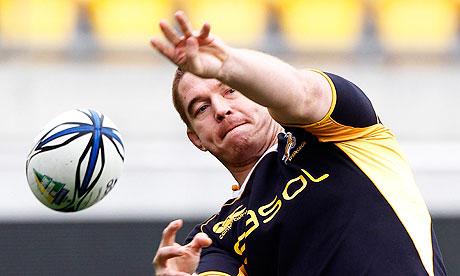
There have been no more dangerous sides in recent years when the pressure is on than South Africa, but even their powers of recovery will be tested against New Zealand in Wellington tomorrow morning, seven days after they were ambushed in Auckland.
Two years ago the Springboks followed up a defeat in Wellington with victory in Dunedin a week later, but it was the manner of the Tri-Nations reverse at Eden Park last Saturday that startled everyone, the All Blacks included. South Africa were outmuscled as well as outpaced and the losing margin would have been more than 20 points had New Zealand not lost the penalty count so heavily.
Eden Park was taken as a sign that South Africa's tactics of kick and chase, moulded in the era of the experimental law variations, had become obsolete. The All Blacks relied on speed, runners taking the ball at pace and making sure the ball was recycled quickly, while the Springboks had little to offer beyond high kicks from Ricky Januarie, Morne Steyn and Zane Kirchner.
Their back line looked dysfunctional, with the centre Jean de Villiers on the wing, but the only changes to the side have been at forward where CJ van der Linde replaces the injured Jannie du Plessis at prop and Danie Rossouw takes over from the suspended Bakkies Botha.
Peter de Villiers, the South Africa coach, is not prone to panic and has selected the most experienced Springbok team ever, with a total of 700 caps. The excuse of jet-lag was offered last week with the visitors delaying their arrival in New Zealand, but that explanation will not be available in Wellington where conditions – wind and rain are forecast – should suit the lumpen South African pack. That will not matter, however, if the All Blacks control the scrum and the lineout as assuredly as they did in Auckland.
"We just didn't execute very well last weekend and we've certainly upped the ante this week in training," said the South Africa captain, John Smit. "The transformation won't come from the training field but from upstairs," he added, pointing to his head. "We can take the experience from the turnaround week in New Zealand in 2008: it showed what can be done if you apply yourself."
The New Zealand assistant coach, Wayne Smith, wondered earlier this week whether referees were fit enough to keep up with play when the All Blacks were in full flow. Despite their comfortable victory in Auckland, the hosts were not impressed by the referee, Alan Lewis. The head coach, Graham Henry, described tomorrow's official, Alain Rolland, as the best in the world.
New Zealand believed that Lewis, who like Rolland is from Ireland, was generally not quick enough arriving at the breakdown, allowing South African tacklers, they claimed, time to slow down ball. The All Blacks were on a number of occasions penalised for holding on.
With the World Cup 14 months away, Henry is anxious for a fundamental change in the game's mindset so that officiating rewards teams who play with a high tempo, such as his own, rather than those with a perceived more conservative approach, such as South Africa.
"Last week everyone was wondering where we were at and the challenge this weekend is to be able to back up that performance," said the New Zealand captain, Richie McCaw. "They [South Africa] are going to be pretty physical after not getting that part of their game right in Auckland and we have to make sure we are ready for whatever they throw at us."

